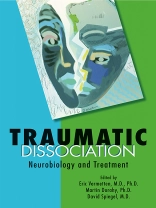Traumatic Dissociation: Neurobiology and Treatment offers an advanced introduction to this symptom, process, and pattern of personality organization seen in several trauma-related disorders, including acute stress disorder, posttraumatic stress disorder (PTSD), and the dissociative disorders. Our understanding of traumatic dissociation has recently been advanced by neuroimaging technology, empirically-based investigation, and an acknowledgment of its importance in psychopathology. The authors of this volume tie these findings together, tracking the condition from its earliest historical conceptualization to its most recent neurobiological understanding to provide even greater insight into traumatic dissociation and its treatment.
Bringing together for the first time theoretical, cognitive, and neurobiological perspectives on traumatic dissociation, this volume is designed to provide both empirical and therapeutic insights by drawing on the work of many of the main contributors to the field. Opening chapters examine historical, conceptual, and theoretical issues and how other fields, such as cognitive psychology, have been applied to the study of traumatic dissociation. The following section focuses specifically on how neurobiological investigations have deepened our understanding of dissociation and concluding chapters explore issues pertinent to the assessment and treatment of traumatic dissociation. The interacting effects of traumatic experience, developmental history, neurobiological function, and specific vulnerabilities to dissociative processes that underlie the occurrence of traumatic dissociation are among some of the key issues covered. The book’s significant contributions include A review of cognitive experimental findings on attention and memory functioning in dissociative identity disorder An appreciation of how the literature on hypnosis provides a greater understanding of perceptual processing and traumatic stress Ascertaining symptoms of dissociation in a military setting and in other situations of extreme stress An outline of key issues for planning assessment of traumatic dissociation, including a critique of its primary empirically supported standardized measures An examination of the association between child abuse or neglect and the development of eating disorders, suggesting ways to therapeutically deal with negative body experience to reduce events that trigger dissociation A description of neuroendocrine alterations associated with stress, pointing toward a better understanding of the developmental effects of deprivation and trauma on PTSD and dissociation A review of the relation of attachment and dissociation A discussion of new research findings in the neuroimaging of dissociation and a link between cerebellar functioning and specific peritraumatic experiences
Useful as a clinical reference or as ancillary textbook, Traumatic Dissociation reorganizes phenomenological observations that have been overlooked, misunderstood, or neglected in traditional training. The research and clinical experience described here will provide the basis for further clinical and theoretical formulations of traumatic dissociation and will advance empirical examination and treatment of the phenomenon.
Table des matières
Contributors Preface Introduction Part 1: Conceptual Domain of Dissociation Chapter 1. Relationship Between Trauma and Dissociation: A Historical Analysis Chapter 2. Attachment, Disorganization, and Dissociation Chapter 3. Memory and Attentional Processes in Dissociative Identity Disorder: A Review of the Empirical Literature Chapter 4. Relationships Between Dissociation and Posttraumatic Stress Disorder Chapter 5. Perceptual Processing and Traumatic Stress: Contributions From Hypnosis Part II: Neurobiology of Traumaand Dissociation Chapter 6. Translational Research Issues in Dissociation Chapter 7. Neuroendocrine Markers of Early Trauma: Implications for Posttraumatic Stress Disorders Chapter 8. Symptoms of Dissociation in Healthy Military Populations: Why and How Do War Fighters Differ in Responses to Intense Stress?Chapter 9. Peritraumatic Dissociation: Time Perception and Cerebellar Regulation of Psychological, Interpersonal, and Biological Processes Chapter 10. Posttraumatic Stress Disorder Symptom Provocation and Neuroimaging: Heterogeneity of Response Chapter 11. Psychobiology of Traumatization and Trauma-Related Structural Dissociation of the Personality Part III: Contemporary Implications for Assessment and Treatment Chapter 12. Psychiatric Approaches to Dissociation: Integrating History, Biology, and Clinical Assessment Chapter 13. Psychological Assessment of Posttraumatic Dissociation Chapter 14. Dissociative Identity Disorder: Issues in the Iatrogenesis Controversy Chapter 15. Applications of Innate Affect Theory to the Understanding and Treatment of Dissociative Identity Disorder Chapter 16. Trauma, Dissociation, and Impulse Dyscontrol: Lessons From the Eating Disorders Field Chapter 17. Treatment of Traumatic Dissociation Afterword Index
A propos de l’auteur
Eric Vermetten, M.D., Ph.D., is Head of Research for Military Mental Health at Central Military Hospital and Associate Professor of Psychiatry at the University Medical Center Utrecht in Utrecht, the Netherlands.Martin J. Dorahy, Ph.D., is Clinical and Research Psychologist at the Trauma Resource Centre, North & West Belfast Health and Social Services Trust, and Research Tutor in the School of Psychology at The Queen’s University of Belfast in Northern Ireland.David Spiegel, M.D., is Jack, Lulu, and Sam Wilson Professor at the School of Medicine, Associate Chair of Psychiatry and Behavioral Sciences, and Medical Director at the Center for Integrative Medicine at Stanford University in Stanford, California.












